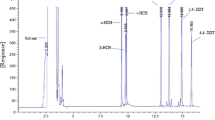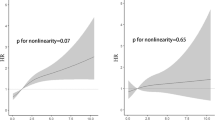Abstract
Organochlorine pesticides (OCPs) are endocrine-disrupting chemicals (EDCs) that even at very low levels can cause cancer by increasing the activity of tumor cells and suppressing the immune system. There is also little information on OCPs and survival after diagnosis. The aim of this study was to monitor the concentration of OCPs in the blood serum of cancer patients and its relationship with their socio-demographic characteristics and ultimately that impact on survival time and hazard ratio (HR). This cross-sectional study included 89 diagnosed patients with cancer in Isfahan, Iran. 12 types of OCPs were measured in serum by gas chromatography (7GC) with an electron capture detector and equipped with mass spectrometer (MS). Also, participants’ questionnaire was completed to collect information. T-test, ANOVA, and Chi-square tests were used to evaluate the association between serum levels of OCPs and quantitative and qualitative information of patients. Survival analysis was also examined based on Kaplan–Meier method, log-rank test, and Cox model. The mean of total OCPs in patients’ serum was calculated to be 1.82 ± 1.36 μg/L. Concentration of 2,4′ DDE had a significant relationship with body mass index (BMI) (kg/m2) (P < 0.05). In addition, gender revealed a significant correlation in estimating survival time (P < 0.05). Non-exposure to OCPs showed a positive effect on increasing the life expectancy of patients. Lindane and endosulfan increased the risk of death by 16% and 37%, respectively, with insignificant P value (P > 0.05). The findings of the present study showed adverse effects of OCPs on patients’ survival time and increased mortality of HR. Moreover, as the first research conducted in the study area, it is suggested management of environmental, individual and social factors that could be influenced the biological accumulation of OCPs in humans and cause health promotion.



Similar content being viewed by others
Data availability
All data generated and analyzed during this study are available from the corresponding author on reasonable request.
References
Abbasi-Jorjandi M, Asadikaram G, Abolhassani M, Fallah H, Abdollahdokht D, Salimi F, Faramarz S, Pournamdari M (2020) Pesticide exposure and related health problems among family members of farmworkers in southeast Iran. A case-control study. Environ Pollut 0269-7491. https://doi.org/10.1016/j.envpol.2020.115424
Abolhassani M, Asadikaram G, Paydar P, Fallah H, Aghaee-Afshar M, Moazed V, Akbari H, Mohaddam SD, Moradi A (2019) Organochlorine and organophosphorus pesticides may induce colorectal cancer; a case-control study. Ecotoxicol Environ Saf 178:168–177. https://doi.org/10.1016/j.ecoenv.2019.04.030
Attaullah M, Yousuf MJ, Shaukat S, Anjum SI, Ansari MJ, Buneri ID, Tahir M, Amin M, Ahmad N, Khan SU (2018) Serum organochlorine pesticides residues and risk of cancer: a case-control study. Saudi J Biol Sci 25:1284–1290. https://doi.org/10.1016/j.sjbs.2017.10.023
Bie R, Zhang J, Wang Y, Jin D, Yin R, Jiang B, Cao J (2022) Analysis of multiclass pesticide residues in tobacco by gas chromatography quadrupole time-of-flight mass spectrometry combined with mini solid-phase extraction. Separations 9:104. https://doi.org/10.3390/separations9050104
Brureau L, Multigner L, Hamdy F, Blanchet P, Bryant R (2021) Organochlorine pesticide exposure and risk of prostate cancer development and progression: a systematic review. F1000Res, 10, 262. https://doi.org/10.12688/f1000research.29990.1
Dehghani R, LimoeI M, Zarghi I (2012) Investigating the harmful effects of pesticides with emphasis on the issue of resistance in arthropods is important. Health (Review Article). Sci J Kurd Univ Med Sci 17:82–98
Deng H, Eckel SP, Liu L, Lurmann FW, Cockburn MG, Gilliland FD (2017) Particulate matter air pollution and liver cancer survival. Int. J. Cancer Res(IJC), 141, 744–749. https://doi.org/10.1002/ijc.30779
Deziel NC, Warren JL, Huang H, Zhou H, Sjodin A, Zhang Y (2021) Exposure to polychlorinated biphenyls and organochlorine pesticides and thyroid cancer in Connecticut women Environ. Environ Res 192:110333. https://doi.org/10.1016/j.envres.2020.110333
Docea AO, Vassilopoulou L, Fragou D, Arsene AL, Fenga C, Kovatsi L, Petrakis D, Rakitskii VN, Nosyrev AE, Izotov BN (2017) CYP polymorphisms and pathological conditions related to chronic exposure to organochlorine pesticides. Toxicol Rep 4:335–341. https://doi.org/10.1016/j.toxrep.2017.05.007
Eckel SP, Cockburn M, Shu Y-H, Deng H, Lurmann FW, Liu L, Gilliland FD (2016) Air pollution affects lung cancer survival. Thorax 71:891–898. https://doi.org/10.1136/thoraxjnl-2015-207927
Eldakroory S, Morsi DE, Abdel-Rahman R, Roshdy S, Gouida M, Khashaba E (2017) Correlation between toxic organochlorine pesticides and breast cancer. Hum Exp Toxicol 36:1326–1334. https://doi.org/10.1177/2F0960327116685887
Fang J, Wu Q, Zhao Y, Zhao H, Xu S, Cai Z (2017) Comparison of different mass spectrometric approaches coupled to gas chromatography for the analysis of organochlorine pesticides in serum samples. J Chromatogr B 1040:180–185. https://doi.org/10.1016/j.jchromb.2016.12.001
Fang J, Zhao H, Zhang Y, He Y, Sun Q, Xu S, Cai Z (2019) Performance of atmospheric pressure gas chromatography-tandem mass spectrometry for the analysis of organochlorine pesticides in human serum. Anal Bioanal Chem 411:4185–4191
He T-T, Zuo A-J, Wang J-G, Zhao P (2017) Organochlorine pesticides accumulation and breast cancer: a hospital-based case–control study. Tumor Biol 39:1010428317699114. https://doi.org/10.1177/2F1010428317699114
Jayaraj R, Megha P, Sreedev P (2016) Organochlorine pesticides, their toxic effects on living organisms and their fate in the environment. Interdiscip Toxicol 9:90. https://doi.org/10.1515/intox-2016-0012
Jhamtani RC, Shukla S, Sivaperumal P, Dahiya M, Agarwal R (2018) Impact of co-exposure of aldrin and titanium dioxide nanoparticles at biochemical and molecular levels in Zebrafish. Environ Toxicol Pharmacol 58:141–155. https://doi.org/10.1016/j.etap.2017.12.021
Kaur N, Swain SK, Banerjee BD, Sharma T, Krishnalata T (2019) Organochlorine pesticide exposure as a risk factor for breast cancer in young Indian women: a case–control study. South Asian J Cancer 8:212–214. https://doi.org/10.4103/sajc.sajc_427_18
Lerro CC, Freeman LEB, Dellavalle CT, Andreotti G, Hofmann JN, Koutros S, Parks CG, Shrestha S, Alavanja MC & Blair A (2021) Pesticide exposure and incident thyroid cancer among male pesticide applicators in agricultural health study Environ Int. 146, 106187. https://doi.org/10.1016/j.envint.2020.106187
Mahdavi V, Eslami Z, Gordan H, Ramezani S, Peivasteh-Roudsari L, Maˈmani L, Khaneghah AM (2022a) Pesticide residues in green-house cucumber, cantaloupe, and melon samples from Iran: a risk assessment by Monte Carlo Simulation. Environ Res 206:112563. https://doi.org/10.1016/j.envres.2021.112563
Mahdavi V, Eslami Z, Molaee-Aghaee E, Peivasteh-Roudsari L, Sadighara P, Fakhri Y, Ravanlou AA (2022b) Evaluation of pesticide residues and risk assessment in apple and grape from western Azerbaijan Province of Iran. Environ Res 203:111882. https://doi.org/10.1016/j.envres.2021.111882
Mekonen S, Ibrahim M, Astatkie H, Abreha A (2021) Exposure to organochlorine pesticides as a predictor to breast cancer: a case-control study among Ethiopian women. PLoS One 16:e0257704. https://doi.org/10.1371/journal.pone.0257704
Miao Y, Rong M, Li M, He H, Zhang L, Zhang S, Liu C, Zhu Y, Deng Y-L, Chen P-P (2021) Serum concentrations of organochlorine pesticides, biomarkers of oxidative stress, and risk of breast cancer. Environ Pollut 286:117386. https://doi.org/10.1016/j.envpol.2021.117386
Mortazavi N, Asadikaram G, Ebadzadeh MR, Kamalati A, Pakmanesh H, Dadgar R, Moazed V, Paydar P, Fallah H, Abolhassani M (2019) Organochlorine and organophosphorus pesticides and bladder cancer: a case-control study. J Cell Biochem 120:14847–14859. https://doi.org/10.1002/jcb.28746
Mostafalou S, Karami-Mohajeri S, Abdollahi M (2013) Environmental and population studies concerning exposure to pesticides in Iran: a comprehensive review. Iran. Red Crescent Med. J., 15. https://doi.org/10.1002/jcb.28746
Musazadeh M, Khanjani N (2015) Human contamination with organochlorine pesticides in Iran: Asystematic review. J Health De 4:76–88
Pastor Belda M, González-Franco JA, Rubio R, Campillo N, Hernández-Córdoba M, Torres C, Pérez-Cárceles MD, Viñas P (2021) Occurrence of organochlorine pesticides in human tissues assessed using a microextraction procedure and gas chromatography–mass spectrometry. J Anal Toxicol 45:84–92. https://doi.org/10.1093/jat/bkaa036
Paydar P, Asadikaram G, Fallah H, Zeynali Nejad H, Akbari H, Abolhassani M, Moazed V, Khazaeli P, Heidari MR (2019) Serum levels of organochlorine pesticides and breast cancer risk in Iranian women. AECT 77:480–489. https://doi.org/10.1007/s00244-019-00648-3
Pestana D, Teixeira D, Faria A, Domingues V, Monteiro R, Calhau C (2015) Effects of environmental organochlorine pesticides on human breast cancer: putative involvement on invasive cell ability. Environ Toxicol 30:168–176. https://doi.org/10.1002/tox.21882
Pirsaheb M, Limoee M, Namdari F, Khamutian R (2015) Organochlorine pesticides residue in breast milk: a systematic review. MJIRI 29:228
Rafeeinia A, Asadikaram G, Karimi-Darabi M, Abolhassani M, Abbasi-Jorjandi M, Moazed V (2022) Organochlorine pesticides, oxidative stress biomarkers, and leukemia: a case-control study. JIM. https://doi.org/10.1136/jim-2021-002289
Ramezani S, Mahdavi V, Gordan H, Rezadoost H, Conti GO, Khaneghah AM (2022) Determination of multi-class pesticides residues of cow and human milk samples from Iran using UHPLC-MS/MS and GC-ECD: a probabilistic health risk assessment. Environ Res, 112730. https://doi.org/10.1016/j.envres.2022.112730
Rani M, Shanker U, Jassal V (2017) Recent strategies for removal and degradation of persistent & toxic organochlorine pesticides using nanoparticles: a review. J Environ Manage 190:208–222. https://doi.org/10.1016/j.jenvman.2016.12.068
Rodgers KM, Udesky JO, Rudel RA, Brody JG (2018) Environmental chemicals and breast cancer: an updated review of epidemiological literature informed by biological mechanisms. Environ Res 160:152–182. https://doi.org/10.1016/j.envres.2017.08.045
Rodríguez ÁGP, López MIR, Casillas TÁD, León JAA, Mahjoub O, Prusty AK (2017) Monitoring of organochlorine pesticides in blood of women with uterine cervix cancer. Environ Pollut 220:853–862. https://doi.org/10.1016/j.envpol.2016.10.068
Sabarwal A, Kumar K, Singh RP (2018) Hazardous effects of chemical pesticides on human health–cancer and other associated disorders. Environ Toxicol Pharmacol 63:103–114. https://doi.org/10.1016/j.etap.2018.08.018
Singh Z, Kaur J, Kaur R, Hundal SS (2016) Toxic effects of organochlorine pesticides: a review. Am J Biosci 4:11. https://doi.org/10.11648/j.ajbio.s.2016040301.13
Soliman AS, Smith MA, Cooper SP, Ismail K, Khaled H, Ismail S, Mcpherson RS, Seifeldin IA, Bondy ML (1997) Serum organochlorine pesticide levels in patients with colorectal cancer in Egypt. Arch Environ Health 52:409–415. https://doi.org/10.1080/00039899709602219
Taiwo AM (2019) A review of environmental and health effects of organochlorine pesticide residues in Africa. Chemosphere 220:1126–1140. https://doi.org/10.1016/j.chemosphere.2019.01.001
Thomas A, Toms L-ML, Harden FA, Hobson P, White NM, Mengersen KL, Mueller JF (2017) Concentrations of organochlorine pesticides in pooled human serum by age and gender. Environ Res 154:10–18. https://doi.org/10.1016/j.envres.2016.12.009
Wolff MS, Zeleniuch-Jacquotte A, Dubin N, Toniolo P (2000) Risk of breast cancer and organochlorine exposure. Cancer Epidemiol Biomarkers Prev (CEBP) 9:271–277
Yin S, Wei J, Wei Y, Jin L, Wang L, Zhang X, Jia X, Ren A (2020) Organochlorine pesticides exposure may disturb homocysteine metabolism in pregnant women. Sci Total Environ 708:135146. https://doi.org/10.1016/j.scitotenv.2019.135146
Vaezzadeh V, Moradi AM, Sari AE, Fatemi SM (2008) Study of organochlorine pesticides in muscle tissue of two commercial fish species (Cyprinus carpio & Rutilus frisii kutum) in Southwest of the Caspian Sea. Environ Sci 5:33–40
Zare S, Behzadi M, Tarzanan M, Mohamadi MB, Omidi L, Heydarabadi AB, Kazemi S (2015) The impacts of pesticides on the health of farmers in Fasa Iran. Electron Phys 7:1168
Funding
The authors would like to thank the Isfahan University of Medical Sciences, Isfahan, Iran, for its financial support (Research Project No.398359).
Author information
Authors and Affiliations
Contributions
Raziyeh Kiyani contributed to the investigation, data curation, and writing original draft. Bahare Dehdashti contributed to the concept, conducting the study, and writing original draft. Zahra Heidari contributed to the investigation, statistical analysis, and revising the manuscript. Seyedeh Maryam Sharafi contributed to the investigation and revising the manuscript. Mehdi Mahmoodzadeh contributed to the conducting the study and revising the manuscript. Mohammad Mehdi Amin contributed to the conceptualization, supervision, methodology, software, writing, review, and editing. All authors approved the final draft of the manuscript for submission and accept the responsibility of its content.
Corresponding author
Ethics declarations
Ethics approval
Approval number is IR.MUI.RESEARCH.REC.1398.597.
Consent to participate
This is not applicable.
Consent for publication
This is not applicable.
Competing interests
The authors declare no competing interests.
Additional information
Responsible Editor: Lotfi Aleya
Publisher's note
Springer Nature remains neutral with regard to jurisdictional claims in published maps and institutional affiliations.
Rights and permissions
Springer Nature or its licensor (e.g. a society or other partner) holds exclusive rights to this article under a publishing agreement with the author(s) or other rightsholder(s); author self-archiving of the accepted manuscript version of this article is solely governed by the terms of such publishing agreement and applicable law.
About this article
Cite this article
Kiyani, R., Dehdashti, B., Heidari, Z. et al. Biomonitoring of organochlorine pesticides and cancer survival: a population-based study. Environ Sci Pollut Res 30, 37357–37369 (2023). https://doi.org/10.1007/s11356-022-24855-z
Received:
Accepted:
Published:
Issue Date:
DOI: https://doi.org/10.1007/s11356-022-24855-z




